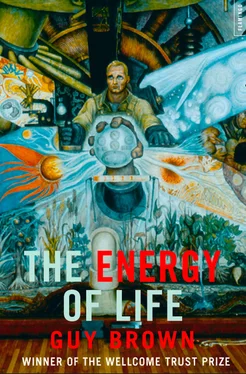Mayer’s ideas on the conservation of forces were not sufficiently general and quantitative to convince most scientists that something important had been discovered. This situation was dramatically changed by the great German physiologist Hermann von Helmholtz (1821–94), who in 1847 at twenty-six published his famous paper o n the conservation of force . Helmholtz gave an exact quantitative definition of energy, explaining how the conservation of energy followed naturally from the known laws of physics. Using these principles, he suggested that heat and work generated by animals must derive entirely from the burning of food in respiration. Although Helmholtz was strongly sympathetic to von Liebig’s work, he pointed out that the vital force was incompatible with the conservation of energy (because the vital force could be converted into physical forces but not vice versa), and must thus be discarded by the new science of energy. Helmholtz was a founding member of a school of German physiologists (known variously as the Helmholtz, Berlin or 1847 School of Physiologists) who sought to explain all biological processes in terms of known physical, rather than vital, forces.
According to Helmholtz’s version of the conservation of energy, there was a single, indestructible and infinitely transformable energy basic to all nature. This ‘Energy’ was more fundamental to the Universe than matter and force, as the overarching theory of the conservation of energy constrained the manifest forms of matter and motion. Energy was well on its way to replacing God. The good news of the First Law was that the Universe was now a vast reservoir of protean energy awaiting conversion into work. The bad news of the Second Law was that this conversion was taxed by the dissipation of some energy into heat. Although all forms of energy were equal, some forms were more equal than others.
The discovery of the conservation of energy was partly due to the recognition that any quest to build a perpetual-motion machine was doomed. In the eighteenth century the French Academy of Sciences had set up a commission to examine proposals for building such a mythical machine: although many tried (including the young Mayer) all had failed. Such a machine would produce motion and work out of nothing. It would be an ‘unmoved mover’, something that Aristotle had associated with God alone. The recognition that perpetual motion was impossible led to the idea that all motion must arise from some prior, actual or potential motion: no change without a prior change. Therefore the whole history of the Universe was locked into one single causal web. Helmholtz criticized von Liebig’s concept of the vital force powering muscle contraction because the concept allowed the possibility of a perpetual motion machine which he considered impossible. But if energy conservation prevented the vital force from acting, some thought it would also prevent God interfering with the material world. Lord Kelvin magnanimously gave God a special dispensation to create or destroy energy. But others were less generous, relegating Him to the role of creating a fixed amount of energy at the start of the Universe and then sitting impotently on the sidelines as the consequences of His creation unfolded. Surprisingly some physicists now believe that the net amount of energy at the beginning of the Universe was zero, so perhaps it was God who was lacking in generosity.
The ancient Greeks said Prometheus had stolen fire from the gods, given it to mankind and with it part of their divine knowledge and power. Now, through Helmholtz and the others, mankind had acquired the concept of energy itself, and with it a greatly increased power for good or evil. If this concept of energy could be used to understand the secret of life and death, then perhaps death itself could be conquered and humans might at last become immortal gods.
The relation between respiratory heat production and muscle work and in general the coupling between respiration and energy use in the body still remained obscure throughout the nineteenth century. It was gradually established that respiration – oxygen consumption, carbon dioxide and heat production – occurred within the tissue cells, rather than in the lungs or blood. It was thus suggested that muscles might work as biological steam engines using the heat generated by respiration to drive contraction. But by the end of the century, it was realized that this would not work, as the Second Law of Thermodynamics indicates that heat is a very inefficient source of work unless the temperature difference between machine and environment is very high. At normal physiological temperatures a heat engine would therefore be extremely inefficient, generating very little work for the amount of food burnt. The only realistic way of using respiration to drive muscle contraction was to bypass heat production and pass the energy released by respiration through some intermediate energy store to muscle contraction, without releasing the energy as heat. But it took another century to work out how this feat was achieved.
The historical trail we have followed in pursuit of the secrets of life and energy has branched many times as the questions have multiplied, and the answers have led us off into territory ever more obscure and abstruse. To summarize, before pressing on in the next chapters to the summit of present understanding of body energy: we started by looking at the general modes of biological explanation in early cultures where energy and life were not distinguished from each other and where all movement and change were attributed to anthropomorphic souls, gods or spirits. Energy, enthusiasm and life were given by the gods and equally spirit and health could be taken away by the gods or devils. Mechanisms were not considered, because ‘mechanism’ was not involved. In ancient Greece and Rome the role of gods and souls gradually diminished. Energy came in the form of pneuma , a spirit of the air, circulating in the body and providing the ‘go’ of life. In Renaissance and Enlightenment Europe, spurred on by advances in technology, gods and souls were ejected from science and replaced by cold mechanics. Crucially, hypotheses were now tested by experiment rather than rational plausibility and this was aided by the injection of mathematics into scientific theories and experiments. Pneuma and spirits were replaced by ‘forces’ and ‘laws’. A component of the air, oxygen, was found to be essential to life and consumed inside the living body in the process of burning digested food, resulting in the production of body heat. This process of respiration was eventually found to be located in the cells of the body and carried out by enzymes, the molecular machines of the cell. The various forces of nature were found convertible between each other and into movement and heat and, thus, were united in the common concept of energy, the universal source of all movement and change. The body then became an energy converter (or engine), channelling the energy released by burning food into movement and thought, but how exactly this was effected was unknown.
The appealing idea of the history of science as a continuous ascent towards the pinnacle of modern truth, is, of course, anathema to most historians. They point out this view of history arises from taking the contemporary truth and weaving a narrative towards it – carefully selecting from the past. My brief historical overview gives little idea of how scientists really thought and operated in the past. It does, however, give us a sense of where our present-day concept of energy came from and how it evolved; and now we must follow it right up to the constantly moving present, where a number of shocks await.
Chapter 3 ENERGY ITSELF
WHAT IS ENERGY?
I taught bioenergetics (the science of body energy) in Cambridge for many years before I realized that I did not, myself, understand what energy was. Tutorials are meant to be cosy but fiercely intellectual chats between a teacher and one or two students. However, teachers can often rattle on without knowing what they are talking about. One fine day I discovered that was true of me and energy. Part of the problem with energy is that it is an abstract idea, so that one answer to the question ‘What is energy?’ is ‘A concept existing in a scientist’s head’. But another, more subtle problem is how the concept of energy has evolved historically, so that many layers of meaning, not always consistent, have been superimposed on the words and symbols. So take heart, if at first you do not understand the meaning of energy, it will not necessarily disqualify you from either doing scientific research or teaching bioenergetics at Cambridge! In science, as in life, you do not necessarily have to understand a concept in order to be able to use it.
Читать дальше












